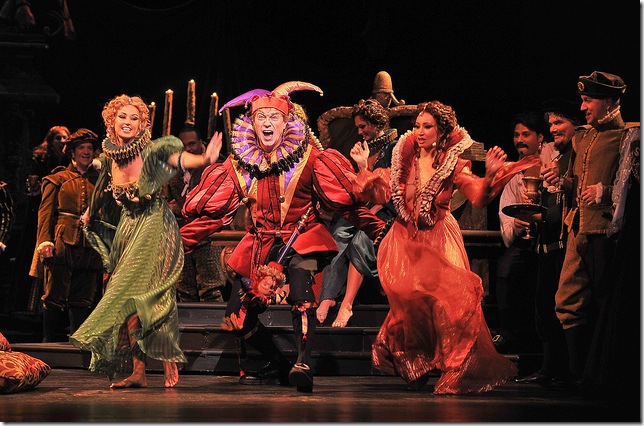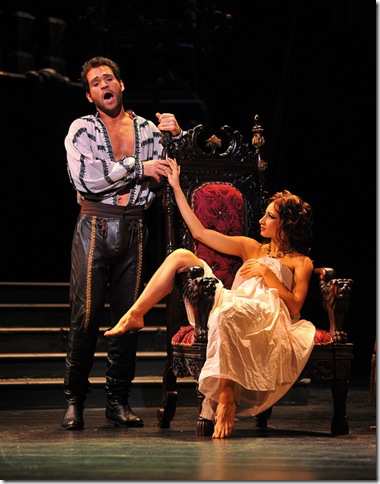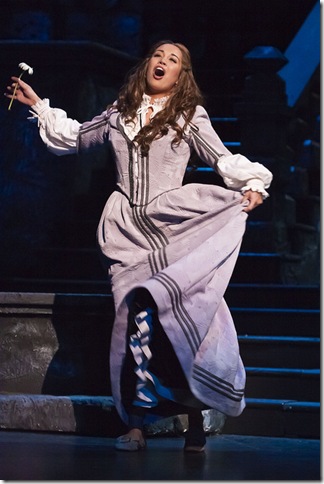Florida Grand Opera’s third production of the season, Verdi’s Rigoletto, closes tonight at the Broward Center for the Performing Arts, and if you can catch it before it leaves, you’ll catch a really fine operatic evening, and see a young soprano on her way up.
FGO produced this 1851 Verdi classic only six years ago, and the current mounting is the ninth in the company’s history. As critics have noted many times, Rigoletto is mostly indestructible, thanks to its exciting story, its indelible melodies (the audience gasped with delighted recognition Thursday night on hearing La donna e mobile in Act III), and interesting characters.
But what that has meant in practice most of the times I’ve seen it is unevenness. Perhaps the Rigoletto is far better than the other characters, perhaps it’s the duke, perhaps Gilda. Here, however, the three principals are excellent, and the opera finally has the balance it needs to carry out Verdi’s vision.
As Rigoletto, Mark Walters is a man tortured, as he is for most of the opera, but in the very first scene he is a man at work: one of the boys, a willing employee of the duke and at the top of his mocking game. That’s important, because a large part of Rigoletto’s motivation is self-loathing, and if he’s already angry at the opening of the show, he has nowhere to travel, and we don’t know why the duke wouldn’t have sent him to 17th-century Mantua’s version of HR for some attitude adjustment.
But Walters was every bit the good jester in the early moments, and he did it beautifully. He has a strong, creamy baritone with a somewhat plaintive upper register that works best in his moments such as the Act I Deh, non parlare, and as one of the anchors of the Bella figlia dell’amore quartet. His is not an enormous voice, but it is flexible and very pleasing, and he knows how to use it to underline his character, which he does masterfully.
As the duke of Mantua, Michael Fabiano is ideal. Handsome and young, he has a powerful spinto that cuts right through the orchestra and the sound of the choral courtiers. Both his Questo e quella and La donna e mobile were absolutely on target, without a sign of vocal strain, and while he could have been slightly more aggressive in his caddishness during Thursday night’s performance, his more laid-back roué made him more credible as someone who really might have settled down with Gilda, even if he’s only fooling himself.
And it was Nadine Sierra as Gilda who made perhaps the biggest impression. She was a lovely Euridice for Palm Beach Opera’s semi-staged production of Gluck’s Orfeo last season, and as a South Florida native, she has received oceans of positive hometown critical ink. But it’s all deserved. Sierra sang as a good a Gilda as I’ve heard in years, and it’s inconceivable to me that she won’t be able to go as high as she wants to go in her profession.
Aside from the good fortune of her physical loveliness (now increasingly important, like it is in Hollywood, for a big career), Sierra possesses a wide-ranging, elegant voice that is a delight to listen to at all times, solo and in combination. But what really impresses the listener about Nadine Sierra is her formidable technique. This is a singer who is able to precisely center every single note right on pitch, and to handle the occasional extravagant bel canto moments Verdi gives her with sovereign ease.
The most splendid case in point was Caro nome. In her higher registers, Sierra’s voice is softer and thinner than it is in her lower regions, and here, surely, is what Verdi had in mind for the high-floating phrases of the aria: Winsomeness, delicacy, a sense of beauty suddenly aware of its power to enchant. You get that sense only if the singer sounds as confident as Sierra did here, and when she lay down on her bed upstairs to sing the last moments of the aria flat on her back, I felt for the first time in a long time absolute certainty that this was a soprano who would nail the high, dreamy interpolated E that ends the piece.
And she did. She also proved to be a fine, engaging actress, though she, like Fabiano, could have drawn things a bit broader: giddier after meeting her lover, or more frantic when she decides she’ll take the knife from Sparafucile. But this was a first-rate performance in general, and like the other two principals, so well-done that the direction and force of the drama was understandable and absorbing.
Kevin Langan made a very good Sparafucile, even if the low F on his first exit was just outside his best-projection compass. It’s a big and muscular voice, and he was suitably menacing and businesslike in his characterization. Mezzo-soprano Dana Beth Miller was a strong Maddalena as well, and her darkly hued, large mezzo voice was the perfect compliment for Fabiano, Walters and Sierra in the great Bella figlia dell’amore quartet in Act III.
The rest of the solo singing – Joo Won Kang as Monterone, Ryan Milstean as Marullo, Craig Colclough as Count Ceprano — was less persuasive, but in her few lines as Countess Ceprano, Courtney McKeown made you want to hear her some more (as indeed she did as one of the friends in FGO’s production last month of Puccini’s La Rondine).
John Keene’s chorus was excellent, even singing the now-corny bouche-fermee passages in the storm scene with admirable accuracy. The orchestra under Andrew Bisantz was terrific, with no noticeable glitches and an expertly judged disbursement of its resources to support the singers and illustrate the action.
Jeffrey Marc Buchman, the stage director, was lucky in the handsomeness of his cast, and he used his allocation of skin with just the right touch. Fabiano goes off to see the captive Gilda without his shirt, and two very pretty prostitutes hang on him in near-deshabille as he hears the courtiers tell of their splendid joke. Walters, too, sports a very convincing hump, and while the curse-of-God display of his affliction during the orchestral prelude was too stagy, it was moving to see him dress himself later on to take up the motley.
The sets by Allan Charles Klein, borrowed from the Cincinnati Opera, are effective without being lavish, and the dancing, choreographed by Rosa Mercedes, was modestly attractive.
Rigoletto is a show in which defects can be covered up by hamminess and the strength of the score, but this production has an unusually fine group of principals that make our time in the theater swift indeed, and eager for more.
Rigoletto will be performed at 8 tonight at the Broward Center for the Performing Arts in Fort Lauderdale. Tickets: $21 and up. Call 800-741-1010 (FGO), 954-462-0222 (Broward Center), or visit www.fgo.org.


